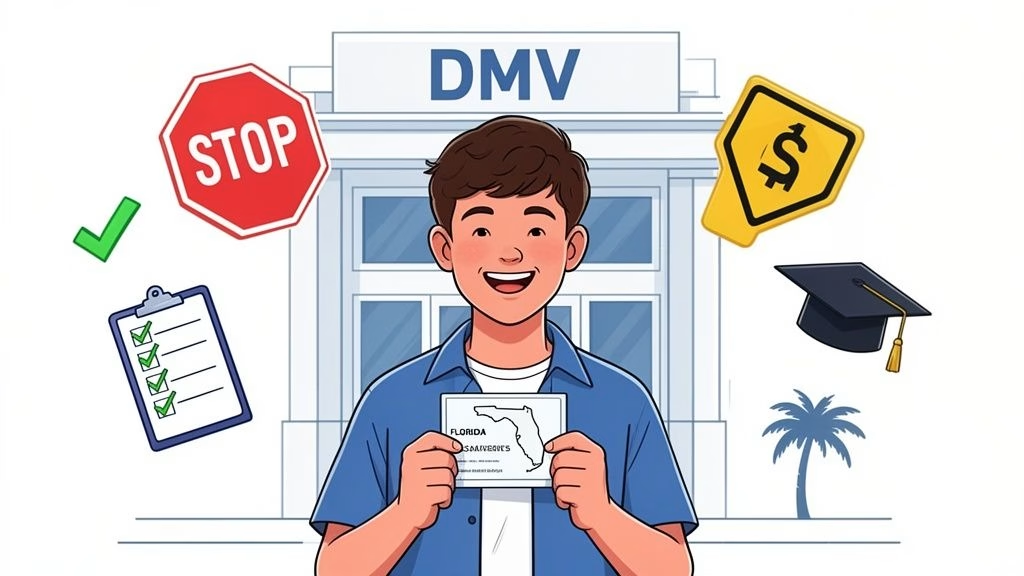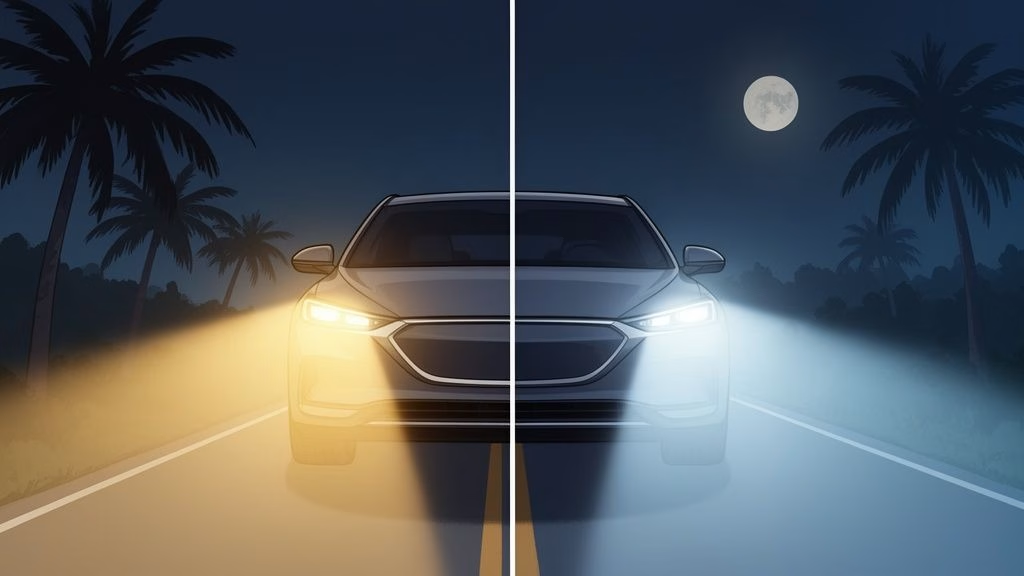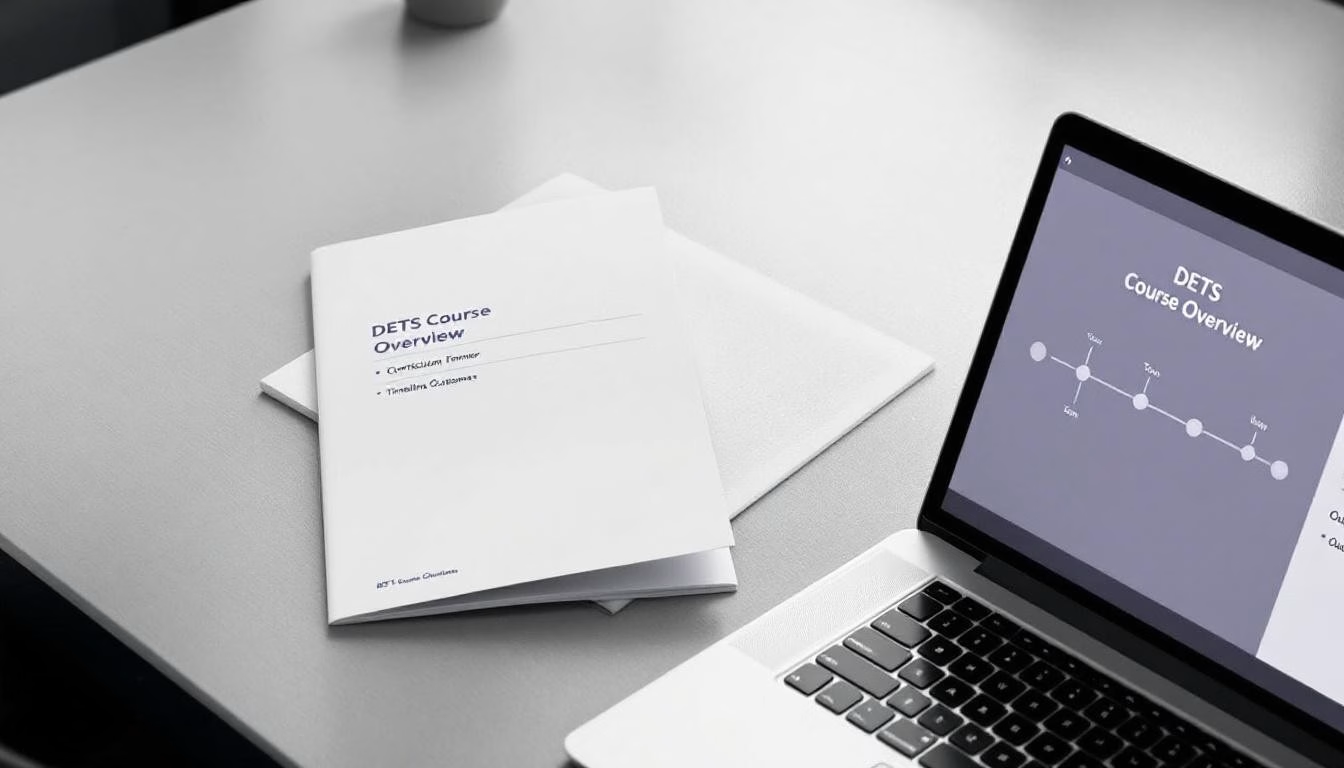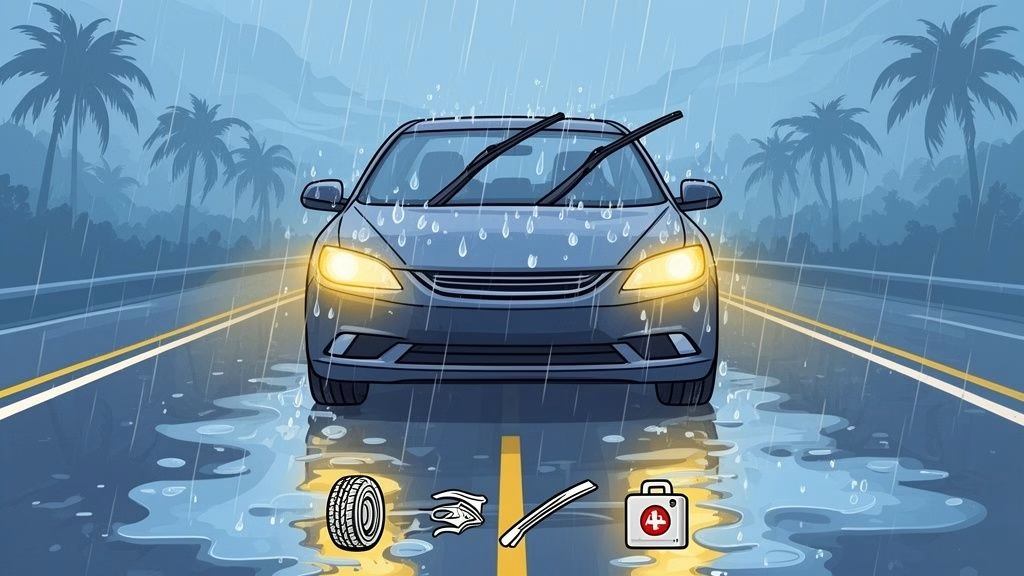Getting a traffic ticket is a real downer. Your mind immediately starts racing�how many points is this? How much is my insurance going to go up? But in Florida, a minor slip-up on the road doesn’t have to spiral into long-term headaches and higher costs.
The four hour driving course in Florida, officially known as the Basic Driver Improvement (BDI) course, is your lifeline. Think of it less as a punishment and more as a do-over�a chance to hit the reset button after a common moving violation.
Your Guide to Florida’s Basic Driver Improvement Course
Instead of just accepting the points from a ticket and waiting for your insurance bill to creep up, Florida gives you a proactive choice. This four hour driving course Florida offers is a state-approved program designed to help good drivers who made a simple mistake. It�s an opportunity to keep your record clean and reinforce the safe driving skills you already have.
This program, which most people just call “traffic school,” has been helping Florida drivers for decades. Since the early 1990s, the state has allowed drivers to take a safety course for common infractions like speeding or failing to yield. It�s a straightforward path to avoid the points that lead to license suspensions and insurance rate hikes.
Why Drivers Take the Florida BDI Course
So, what brings people to this course? It usually boils down to one of three situations. Figuring out which one you fall into will clarify your next steps.
�
| Reason for Taking the Course | Who It Applies To | Primary Benefit |
|---|---|---|
| Court-Ordered Mandate | Drivers ordered by a judge to take the course as part of a traffic citation ruling. | Fulfilling a legal requirement and satisfying the court. |
| Voluntary Point Removal | Drivers with an eligible non-criminal moving violation who choose to take the course. | Preventing points from being added to their license. |
| Insurance Discount | Drivers who proactively take a defensive driving course to lower their premium. | Earning a potential rate reduction from their insurance provider. |
�
Each path leads to the same course, but the motivation is what’s different. Whether you’ve been instructed to attend or you’re doing it to save money, the outcome is positive.
The core idea is simple: you trade a few hours of your time for peace of mind and long-term savings. A single ticket can haunt your insurance premiums for three to five years, making the BDI course a smart financial move.
By completing the four hour driving course Florida requires, you’re doing more than just satisfying a requirement. You�re taking control, protecting your driving record, and keeping more money in your pocket. It turns a negative event like a traffic ticket into a positive outcome that makes you a safer, more aware driver.
For a complete breakdown of how the system works, check out our guide on what is traffic school.
So, you’ve got a traffic ticket and you’re wondering if traffic school is an option. Before you jump into the course, you need to make sure you actually qualify. The good news is that the Florida Department of Highway Safety and Motor Vehicles (FLHSMV) keeps the rules pretty simple for most drivers.
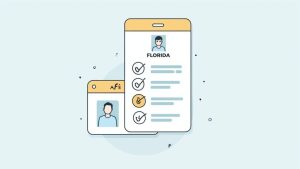
First thing’s first: the ticket has to be for a non-criminal moving violation. Think common slip-ups like speeding (within limits), rolling through a stop sign, or a minor careless driving infraction. If you have a Commercial Driver’s License (CDL) or the violation was criminal, traffic school won’t be an option for getting points off your record.
The Lifetime Limit Rule
Think of traffic school eligibility as having a limited number of “do-overs.” Florida law lets you take a Basic Driver Improvement (BDI) course a maximum of five times in your entire life. This isn’t a loophole for habitual offenders; it’s a second chance for the occasional mistake.
There’s also a time limit to keep in mind. You can only take the course once in any 12-month period. This prevents you from using it for back-to-back tickets. It�s smart to keep track of when you’ve used it, so you know this valuable option is there when you really need it.
The most time-sensitive step? You absolutely must tell the Clerk of Court in the county where you got the ticket that you plan to take the course. This has to be done within 30 days of the citation date. If you miss that window, you lose your chance completely.
Common Disqualifying Violations
While many common tickets are covered, some serious violations will automatically take traffic school off the table. Knowing what these are ahead of time can save you a lot of hassle. You generally can’t elect the course if your ticket was for:
- Speeding 30 mph or more over the limit.
- Illegally passing a stopped school bus while children were getting on or off.
- Being involved in an accident that resulted in serious injury or death.
If your ticket doesn’t fall into one of those serious categories, you’re likely in the clear. You can check out the different state-approved classes for traffic tickets to find one that works for you and start the process of protecting your driving record.
What You�ll Actually Learn in the 4-Hour Course
So, what really goes on during those four hours? If you’re picturing a stuffy classroom and a monotone lecture, you can relax. The state-approved curriculum is designed to be practical, not painful. It�s less about drilling obscure traffic statutes and more about sharpening the real-world skills that keep you safe and ticket-free.

The entire four hour driving course Florida requires is built on a set of core modules. These aren’t random topics; they’re specifically chosen to tackle the most common reasons for crashes and tickets on our state’s roads.
Think of it as a tune-up for your driving brain. It�s all about reconnecting the official rules of the road with the thousands of tiny decisions you make every time you get behind the wheel.
Core Defensive Driving Strategies
A huge chunk of the course is dedicated to what’s known as defensive driving. This isn’t about being paranoid; it’s about being prepared. The whole point is to shift from just reacting to problems to actively anticipating them before they happen.
You’ll get a solid refresher on essential techniques, including:
- The Two-Second Rule: This is the classic for a reason. You’ll master how to maintain a safe following distance so you have enough time to stop, no matter what the car in front of you does.
- Hazard Recognition: This is about training your eyes to see trouble before it starts. You�ll learn how to spot potential dangers like a distracted driver drifting in their lane or a child about to chase a ball into the street.
- Managing Distractions: We all know we shouldn’t text and drive, but this section goes deeper. You�ll see the real impact of distractions�from changing the music to grabbing a snack�and learn practical ways to keep your focus where it belongs: on the road.
This is the part of the course that truly empowers you. You learn to control the space around your vehicle, giving you the upper hand and dramatically reducing your chances of getting another ticket.
A Deep Dive into Florida Traffic Laws
Of course, you also need to know the rules. The course gives you a much-needed review of Florida’s specific traffic laws. Let’s be honest, laws change, and it�s easy to get rusty on the details over the years. This section gets you current.
You can expect to cover the nitty-gritty of things like right-of-way at tricky four-way stops, the serious legal and financial consequences of a DUI, and the specifics of Florida�s Move Over law. Knowing these laws isn’t just about passing the final quiz�it�s about avoiding the exact mistakes that get people pulled over.
By the end of this, you won’t just know what the law says; you’ll understand why it’s in place. That context is what really sticks with you and helps you become a more thoughtful, safer driver.
Choosing Your Learning Environment
Florida gives you options for how you want to complete your four hours, which is great. You can pick the format that actually works with your life and how you learn best.
- Online Courses: This is the king of convenience. You can log in and knock out the modules whenever you want, 24/7, from your couch or a coffee shop. It�s perfect if you have a packed schedule or just prefer to learn at your own speed.
- In-Person Classrooms: For some, nothing beats a live instructor. This traditional setting lets you ask questions in the moment and hear from other drivers. If you learn better through direct interaction and discussion, this is the way to go.
No matter which path you choose, you’re getting the same state-approved curriculum and the same official certificate. The choice is simply about what works for you. Do you need maximum flexibility, or do you thrive on face-to-face instruction? Pick the one that will help you absorb the material best.
Is the Course Actually Worth the Money?
When you get a traffic ticket, your first thought is probably about the fine. But the real financial hit isn’t the ticket itself�it’s the chain reaction that follows. So, when people ask if a four-hour driving course in Florida is worth the cost, the answer is a resounding yes.
Think of it this way: the course fee is a small, one-time investment to prevent a long-term financial headache. It’s your first line of defense against the points that would otherwise tarnish your driving record. Insurance companies see those points and immediately classify you as a higher risk, which is their justification for jacking up your rates.
A single ticket isn’t just a one-and-done payment. It’s the gift that keeps on taking, usually for three to five years, in the form of higher insurance premiums. The BDI course stops that cycle before it even starts.
The Cost of Points vs. The Cost of the Course
Let’s get down to the actual numbers. A Florida four-hour driving course will typically set you back somewhere between $25 and $70, depending on which school you go with. Some providers might charge extras for a final price around $40. Therefore make sure you get the final price before start registering. You can get more details on course costs and point penalties from Driver Educators.
Now, let’s look at the alternative. Just one point on your license can spike your annual insurance premium by 10% to 20%. If you’re paying $2,000 a year for coverage, that’s an extra $200 to $400 out of your pocket. Every. Single. Year.
Over three years, that single ticket could cost you more than $1,200 in extra insurance payments. Suddenly, a course fee of under $70 doesn’t just seem reasonable�it looks like one of the smartest financial decisions a driver can make.
Unlocking Potential Insurance Discounts
Here’s the best part: the course doesn’t just prevent financial pain; it can actively save you money. Many insurance companies offer a voluntary discount to drivers who complete a defensive driving course on their own initiative. It signals to them that you’re a responsible driver, making you a lower risk to insure.
These discounts usually fall in the 5% to 10% range. All it takes is a quick phone call to your insurance agent to see if you qualify. You might be surprised to find out that a few hours of your time can translate directly into ongoing savings. We cover this in more detail in our guide on how much defensive driving can lower your insurance.
Completing the Florida Four Hour Driving Course often paves the way for better rates, so it�s wise to also learn how to find affordable car insurance in Florida. By taking this simple step, you’re not just brushing up on your driving skills�you’re setting yourself up for a better financial future with your insurer.
Your Step-by-Step Guide to Enrollment and Completion
Getting a traffic ticket can feel overwhelming, but the good news is that enrolling in and finishing the four-hour driving course Florida requires is a pretty clear-cut process. The trick is to act fast right at the beginning.
Your first move, and it’s a big one, is to tell the Clerk of Court you plan to take the course. This has to be done in the same county where you got the ticket, and you only have 30 days from the citation date to do it. If you miss that window, you lose your shot at keeping the points off your license. Seriously, don’t put this off.
Finding and Starting Your Course
Once you’ve told the court you’re taking traffic school, it’s time to pick a provider. This part is crucial: you absolutely have to choose a school that’s officially approved by the Florida Department of Highway Safety and Motor Vehicles (FLHSMV). If you go with an unapproved course, the court won’t accept your certificate, and you’ll have wasted your time and money.
After you’ve found an approved school, signing up is usually a breeze and takes just a few minutes online. You�ll just need some info from your driver’s license and the ticket itself. Then you’re all set to jump into the course material whenever it works for you.
Think of it as a simple, three-part journey: sign up, learn, and get your proof of completion.
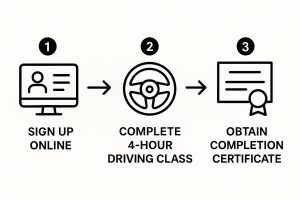
As you can see, the whole thing is built around being convenient, letting you get registered, finish the class, and grab your certificate without a lot of hassle.
The Final Exam and Submitting Your Certificate
At the end of the course, you’ll take a final exam. It’s typically multiple-choice and covers everything you just learned. While state rules require a passing grade, these courses are designed to help you succeed, not trick you. Most schools even let you retake the exam for free if you don’t pass the first time around.
Once you pass, you’ll get your certificate of completion. This is the golden ticket you need to submit to the Clerk of Court. Deadlines for turning this in can differ from county to county, so be sure to confirm the exact date with your court. If you’re looking to make things as easy as possible, an online driving course in Florida can really smooth out the whole experience.
Remember: Hitting that submission deadline is non-negotiable. If your certificate doesn’t get to the court on time, it’s like you never took the course. The points will go on your license, and the ticket will go on your record. Always double-check your county’s specific rules and due dates.
How the Rules Apply to Young and New Drivers
Florida’s traffic laws are especially tough on young and new drivers, and there’s a good reason for it. The state knows that inexperience behind the wheel is one of the biggest risk factors out there, so the rules for traffic school and driver education are designed to be a bit stricter for this group.

While most people can take the standard four hour driving course Florida offers, a judge might decide a younger driver needs something different. Even on a first offense, the court can order a young person into a more specialized program that gets right to the heart of the risks common for their age.
This isn’t about being overly harsh; it’s a reaction to the hard facts. Statistics consistently show that young drivers are involved in more serious accidents, which is why getting the right education early on is so important.
The Specialized �Driving Under 25� Program
Beyond the standard BDI, Florida created a specific course just for drivers between the ages of 15 and 25 who get into certain kinds of trouble on the road. It�s known as the �Driving Under 25� course, and while it’s also four hours long, its content is laser-focused on the challenges this age group faces.
Don’t mistake this for an elective�it’s a required intervention. The curriculum digs into the behaviors that most often lead to crashes for young drivers, like texting, dealing with peer pressure, and underestimating risks.
The whole point of this course is to build a solid foundation of safe driving habits that will stick with them for life. For young drivers, it�s less about just getting points off their license and more about preventing the next incident from ever happening.
The statistics tell the story. The 15�25 age group accounts for over 27% of all fatal crashes in the U.S., even though they only make up about 14% of all licensed drivers. That stark difference is exactly why targeted education is so critical. You can get a better feel for what this program covers by exploring more details on Florida�s specialized youth driving programs.
For parents and young drivers, it�s crucial to understand these standards. It’s a clear signal that the state is serious about safety, especially during those first few critical years on the road.
Answering Your Questions About Florida’s 4-Hour Driving Course
So, you’re looking into the four-hour driving course in Florida. It’s totally normal to have a few questions about how it all works. Getting the right answers upfront is the best way to make sure you do everything correctly and actually reap the benefits of the course.
Let’s cut through the confusion and tackle some of the most common questions people have.
How Can I Be Sure a Course Is Legit and State-Approved?
This is, without a doubt, the most critical question you need to ask. With so many options online, you want to be certain your time and money aren’t wasted on a course the state won’t accept.
The only way to be 100% sure is to check the official source: the Florida Department of Highway Safety and Motor Vehicles (FLHSMV) website. They keep a running list of every single approved course provider, and you can search for a school right there.
A Word of Warning: Picking a school that isn’t on that official list is a huge mistake. The court will flat-out reject your completion certificate. You’ll get no points removed, and you’ll have to pay for and complete the course all over again with a real, approved provider.
What If I Miss the Deadline to Turn in My Certificate?
Missing the court-ordered deadline is a big deal, and the consequences hit fast. If you don’t submit your proof of completion on time, your choice to attend traffic school is canceled, and you’re right back to facing the original ticket penalties.
This means a few things, none of them good:
- The points for the violation will be immediately added to your license.
- The ticket will officially go on your record as a conviction.
- In some cases, you could even have your driver’s license suspended for not following the court’s instructions.
I Have an Out-of-State License. Can I Still Take This Course?
Yes, you can. If you got the ticket here in Florida, you need to complete a Florida-approved BDI course to satisfy the Florida court. Simple as that.
The catch is, you also need to touch base with the DMV in your home state. You’ll want to ask them how they handle out-of-state tickets. Even if you satisfy Florida’s requirements, your own state might still add points to your license according to their own set of rules.
Ready to enroll in a course that’s simple, state-approved, and actually fits your schedule? BDISchool offers a completely online, self-paced program that checks all the boxes for Florida courts. Sign up today and get started on protecting your driving record.


